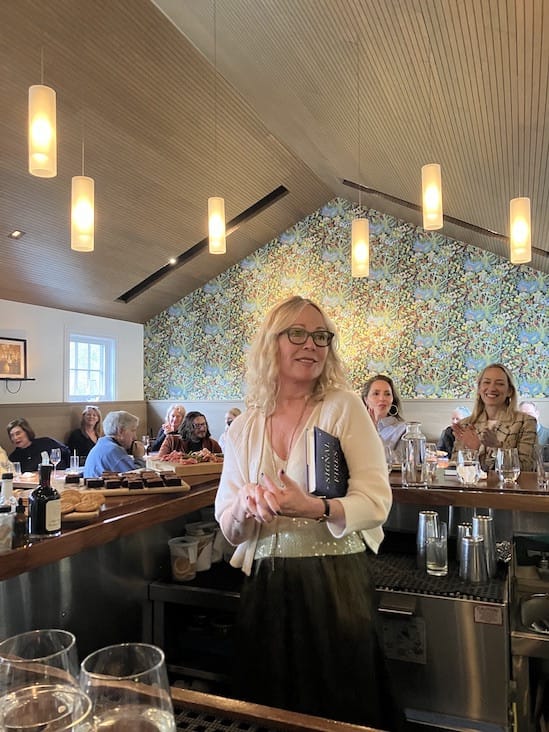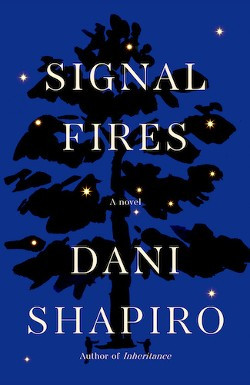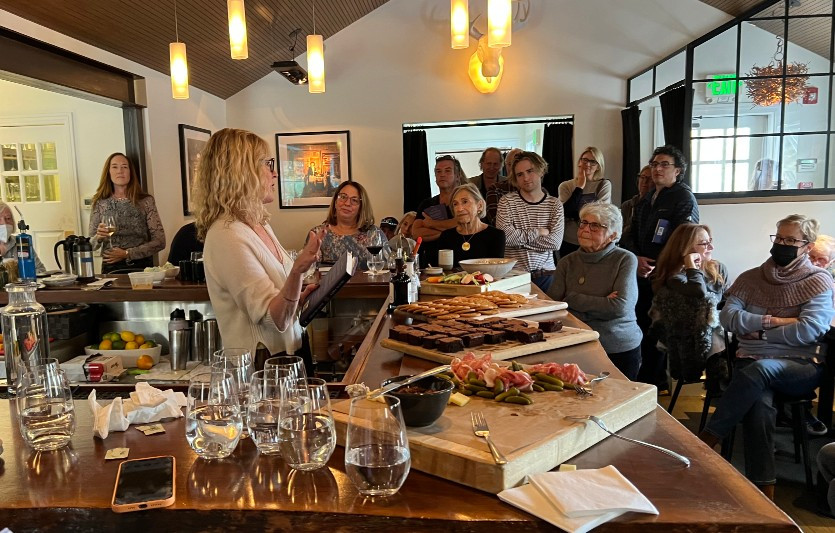Litchfield Author Dani Shapiro Launches Her New Novel, "Signal Fires," In The Neighborhood
Dani Shapiro explores a recurring theme in her work — the accidents of life.

Dani Shapiro explores a recurring theme in her work — the accidents of life.

Dani Shapiro launches her book (and cross-country book tour) at Community Table. Photo: Dan Shaw
It seemed exactly right that Litchfield County’s Dani Shapiro launched the cross-country book tour for her new novel, Signal Fires (Knopf), at a popular local restaurant called Community Table in Washington, Connecticut. She engaged the white-haired ladies from the nearby Hickory Stick Bookshop in Washington Depot to sell copies of Signal Fires at the restaurant so Shaprio could inscribe them for the dozens of neighbors, friends, and fans who gathered for a reading on the afternoon of October 16.
Once the restaurant was standing room only, Shapiro slipped behind the handsome bar and read the book’s pivotal first chapter about a tragic car crash: “Her name is Misty Zimmerman, and if she lives through this night, she will grow up to be a magazine editor, or a high school teacher, or a defense lawyer,” she read. “She will be a mother of three or remain childless. She will die young of ovarian cancer or live to know her great-grandchildren. But these are only a few possible arcs to a life, a handful of shooting stars in the night sky.”

Misty doesn’t live through the night. The two teenagers who survive the car crash that kills her, Theo and Sarah Wilf, are haunted over four decades by the accident. So are their well-meaning parents, Dr. Benjamin and Mimi Wilf, who live in a fictional Hudson River suburb called Avalon.
The accidents of life are a recurrent theme for Shapiro. When she was in her early 20s, Shaprio’s parents were in a catastrophic car crash on the New Jersey Turnpike. The accident forced Shapiro to put the brakes on her out-of-control life, which led her to write her first critically-acclaimed memoir, Slow Motion (1998). She has since published four other absorbing and affecting memoirs — Devotion (2010), Still Writing (2013), Hourglass: Time, Memory, Marriage (2017), and Inheritance: A Memoir of Genealogy, Paternity and Love (2019) — as well as several novels. (My favorite of her earlier fiction is Black and White.)
Another pivotal unforeseen moment in Shapiro’s life occurred in her mid 50s, when she randomly took a mail-order DNA test that would turn her world upside down; it revealed that her adored father was not her biological dad. She then discovered that her parents had gone to a fertility clinic that mixed a patient’s and donors’ sperm, and they never told Shapiro her origin story. The avalanche of emotions and implications that followed led to her writing Inheritance, which in turn, brought her celebrity beyond literary circles with invitations to speak at the Berman Institute of Bioethics at Johns Hopkins University and a public ethics forum at Harvard Medical School. She also started a cross-branded podcast called Family Secrets (now in its seventh season with 26 million downloads so far) in which she intimately and empathetically probes her invited guests on their family secrets.
So it’s not a surprise that a family secret —the Wilfs choose to never discuss the night Misty died — is the dark hole of Signal Fires. “The words that might have been spoken will instead be swallowed,” writes Shapiro. “Unexpressed, they will wind their way through and around each of them like vines choking a stand of untended trees.”

Photo credit: Michael Maren
Shapiro wants readers to consider what the characters’ lives might have been like if they hadn’t stayed silent, and, by extension, for us to imagine how our lives might be different if we did not hold onto our deepest secrets.
Shapiro also encourages us to reflect on the ways we are connected to one another by geography, happenstance, or unknown forces. The heartbeat of the story is the unusual friendship between Ben Wilf and the pre-teen Waldo Shenkman whom the doctor heroically delivered on the Shenkmans’ kitchen floor in an emergency situation on the last night of the 20th century. Waldo is an aspiring astrophysicist, and the connection he has with the doctor is metaphysical, which is another one of Shapiro’ ongoing themes. “Time collapses,” she writes in Signal Fires. “There is no straight line. Memory, history — things that happened fifteen years ago, or fifty — are as alive now as if they had just happened, or are about to happen.”
During a Q&A after the reading, someone asked Shapiro about her next writing project, and she revealed that she is working on a TV pilot based on Signal Fires. “It’s going to be really exciting because these characters who I love so much, I am going to get to keep living with them,” she said. “They are going to have whole lives beyond the hardcover of this book.”